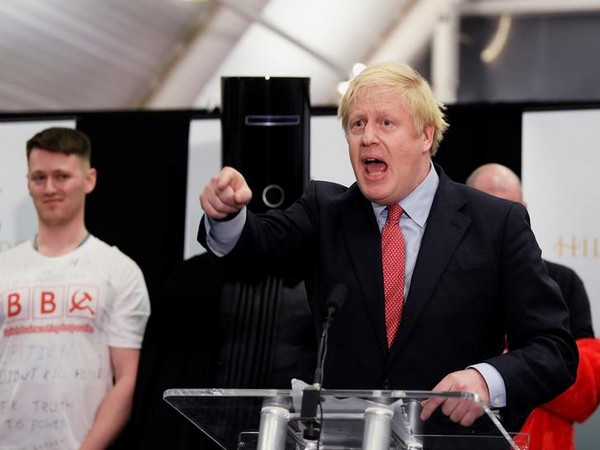UPDATE 1-Reality check for Johnson's Brexit: it's just the beginning

- Country:
- United Kingdom
British Prime Minister Boris Johnson won a sweeping election victory on a promise to "Get Brexit done", but a reality check awaits for voters hoping that the messy divorce is finally over. It's just the beginning.
Johnson should now be able to secure parliamentary approval for the withdrawal deal he struck with the European Union in October so Brexit happens on Jan. 31. Britain then goes into a transition period until the end of 2020. Time enough, says Johnson, to negotiate a new relationship with the EU, including on trade.
But EU diplomats and officials say there could be many potholes along the way, and Britain could still find itself at the cliff edge of a no-deal exit one year from now. "It will be very complicated. It's about an array of relations, in trade, in fishing and cooperation in security and foreign policy," German Chancellor Angela Merkel told an EU summit news conference on Friday.
"Our biggest hurdle will be that we need to sort out these issues very quickly.
" EXTENSION NOW MORE LIKELY
The EU hopes to start trade talks with Britain by March, leaving just 10 months to strike a deal and get it approved by London and the EU, including member states' parliaments. Trade agreements with the EU typically take years to complete, and few in Brussels believe the transition period will be long enough to seal a deal with Britain.
The transition period can be prolonged by one or two years but London must request an extension by the end of June. With a large parliamentary majority, Johnson may pay less heed to hardline Brexiteers in his party than he did before the election and renege on his pre-election pledge not to extend the transition period beyond 2020.
"Johnson's success reduces the likelihood of no-deal next year, as it makes it more probable he will extend the transition period beyond December 2020 if he has to," said Mujtaba Rahman of the Eurasia think tank. If Johnson fails to reach an agreement with the EU by the end of next year, and he refuses to negotiate past his own deadline, then the legal default would be a no-deal divorce.
EU officials point out that the end-June deadline for extending the transition would not be easy to push back. If Britain were to stay in the transition period beyond 2020, it would require a financial settlement as the EU enters its new 2021-27 budget. London would be reluctant to keep on contributing to EU coffers so that discussion would be tricky.
EU WANTS "ZERO DUMPING"
The EU insists it will not seal a trade deal with a large, economically powerful neighbor without solid provisions to guarantee fair competition.
The EU's demands will focus on environmental and labor standards, as well as state aid rules to ensure Britain would not be able to offer products on the bloc's single market at unfairly low prices. In addition to Johnson's push for a "zero tariff, zero quota" trade deal, the bloc wants a guarantee of "zero dumpings".
"If the UK becomes a cross between a casino and Singapore on the Thames, we will be very focused on level playing field issues,” a senior EU diplomat said. Britain's conundrum is that it will be under pressure to loosen rules on agricultural and food standards to strike a bilateral trade deal with the United States. But this would be crossing a red line for the EU, which would restrict access to its market to protect its own producers.
FISHING AND SECURITY
Fishing is a particularly thorny issue as EU countries will no longer be able to operate in British waters as they do now.
The two sides will probably negotiate fishing quotas, as the EU currently does with Norway, whereby so-called total allowable catches are shared among EU countries. But officials say this will be a drawn-out and potentially acrimonious process. With industry supply chains in the EU currently crossing borders multiple times for products like cars and drugs, agreeing on exact rules to designate where products come from - and hence what regulations and taxes apply - will also be fraught.
Another area to work through is security. The EU and Britain say they will share sensitive data for criminal cases, but agreeing on such procedures with third countries has proven complicated and time-consuming for the EU in the past. EU diplomats said that if the hardline Brexit faction of Johnson's party has less clout because of his large majority, the prime minister may favor closer integration with the EU as he negotiates a future relationship.
French President Emmanuel Macron told a news conference in Brussels on Friday that he hopes Johnson leans this way. "If Boris Johnson ... wants a very ambitious trade deal, we need very ambitious regulatory convergence. Be my guest," he said.
(This story has not been edited by Devdiscourse staff and is auto-generated from a syndicated feed.)
ALSO READ
Brussels seeks UNESCO heritage mark for puppetry, flower carpet
Norway follows its neighbour Denmark in planning an increase in conscripted soldiers
GRAPHIC-EVs could overtake petrol cars in Norway by end-2024
Entertainment News Roundup: Brussels seeks UNESCO heritage mark for puppetry, flower carpet
Entertainment News Roundup: Exclusive-Disney prevails over Trian in board fight, sources say; Brussels seeks UNESCO heritage mark for puppetry, flower carpet










